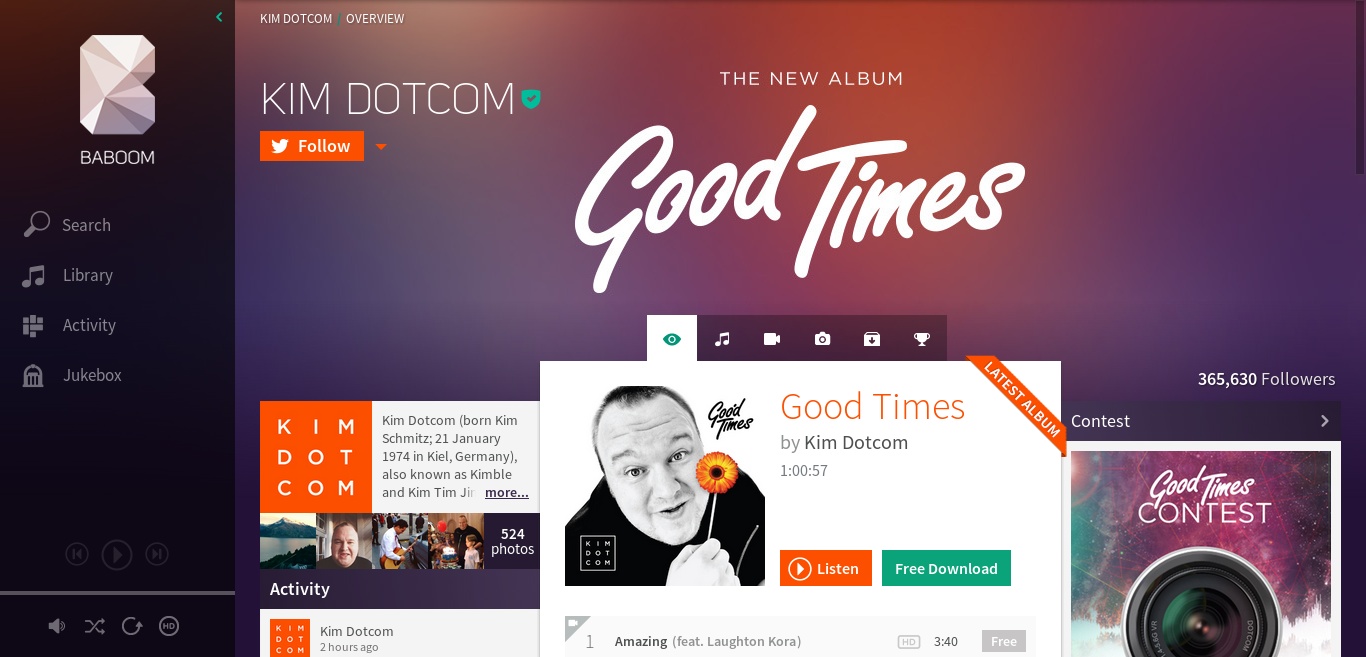Music piracy isn't as big of a problem as it used to be. But where streaming services like Spotify were designed to convert digital pirates into legitimate music consumers, they've also taken a bite out of digital download revenue.
In the first half of 2014, digital download sales declined 11.6% while the number of songs streamed on services like Spotify or Google's (GOOG +2.70%) (GOOGL +2.65%) YouTube increased 42%. All said, this trend is leading to another decline in total revenue for the music industry.
Kim Dotcom, the man behind MegaUpload who's facing the rest of his life in prison, plans to launch a new service later this year that he believes will help further curb piracy and boost revenue. His plan is to let artists give their music away to listeners, and compensate musicians by hijacking the ads users normally see on Google, Facebook (FB +1.27%), or any other website.

Source: Baboom.com
Take from the rich, give to the poor
Dotcom's music service, Baboom, isn't your typical Spotify replacement. The service is focused on providing listeners with an optimal listening experience. That means lossless audio files and certainly no ads between songs. It also means letting users download songs to listen wherever and however they want. (Dotcom is even providing music stems from his own album to let listeners remix his work.)
If listeners really love the music, they can opt to pay for it in their preferred digital music store. But musicians are paid for every download, even the free ones.
Baboom users will be asked to install a browser plugin that operates similarly to an ad blocker. Instead of blocking ads, however, the plugin replaces a certain amount -- 10% to 15% -- with Baboom's own ads. Baboom will keep 10% of the ad revenue and return the other 90% to artists.
Is that even legal?
Ad blockers have been around for years. Google even lets you download them from its Chrome Web Store. Indeed, ad blockers are perfectly legal and widely used. Your web browser is your browser, and you can change how things look and what data it fetches and displays.
Baboom plans to take ad blocking to another level. The principle is, nonetheless, the same.
There are ways to detect ad-blocking software, but there is little that websites can do to stop it, aside from denying service to those who use the software. So far, Google and Facebook haven't done anything to stop ad blocking. That is an option that either company could take if Baboom becomes popular.
How much money are we talking about?
It might be a long time before Baboom makes any impact on the music industry, if it ever does. Its biggest hurdle will be encouraging artists to sign up for the service and provide their music.
Unlike Spotify and other streaming services that negotiate with record labels to gain access to millions of songs, Baboom is unlikely to negotiate with the labels themselves. Dotcom and the Recording Industry Association of America aren't exactly friends, and Dotcom thinks he can do more for artists by circumventing the labels.
Even if a good amount of popular artists sign on to Baboom, user growth will be hard to come by. In six years, Spotify has amassed 40 million users. And that's with the cooperation of major labels.
To put that in perspective, 40 million users is about 4% of Facebook's desktop user base. Facebook generated about $931 million in desktop ad revenue last quarter. If Baboom grows to 40 million users and replaces 15% of Facebook ads with its own, it can generate about $22 million per year. That's if its ads are as expensive as Facebook's, which is unlikely.
Expanding the scope to the entire Internet, eMarketer projects the global digital ad market will grow to $173 billion in 2017, but mobile ads will account for more than 36% of ad dollars. Considering nearly 3 billion people have access to the Internet, 40 million is just a drop in the bucket.
Overall, Baboom might expect to put as much as $500 million in the hands of artists -- if it's popular. Comparatively, the music industry generated about $7 billion in the U.S. alone last year.
Google isn't worried, nor should it be
Google accounts for about 40% of digital ad spending, so it certainly faces the biggest risk from services like Baboom. But the amount of revenue it would be missing out on due to Baboom would be relatively minuscule in relation to the $60 billion in revenue the company brought in last year.
Even if Baboom became a thorn in its side, Google could use the nuclear option and ban users from its websites. If Facebook and other popular sites did the same, I can't imagine Baboom making an impact.



